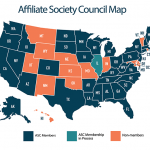“The ACR’s Affiliate Society Council is a two-way communications conduit, to and from the rheumatology practice community, tackling the big issues of the day and the problems we confront daily.” —Alex Limanni, MD, Chair, ACR Affiliate Society Council
Communication is the key to success and this perfectly explains the role of the Affiliate Society Council (ASC). The ASC was started in 2008 to expand on the concept of the Regional Advisory Council (RAC), which was first formed in 2004. The RAC had eight to 10 council members who were asked to monitor various regions of the United States and respond to problems that affected patient care, including insurance carrier policies. Dan Fohrman, MD, served as the first RAC chair and was instrumental in leading the RAC’s evolution to the ASC model, which now represents all state and local societies who apply for membership. The ASC currently has 21 state/local societies. If your society is not a member, please encourage them to join.
As Dr. Limanni states above, the ASC is designed to enhance communication by serving as a “two-way conduit” between the rheumatology practice community and the ACR in order to discuss problems and share solutions. To ensure that they have a good understanding of both the issues facing practitioners as well as the issues and potential solutions ACR can offer, ASC members regularly meet with and provide presentations to the community.
The ASC at Work
One of the first major problems brought to the attention of the RAC—and ultimately acted upon by the ASC—was problematic antinuclear antibody test (ANA) results. John Goldman, MD, who was then serving as the RAC’s Southeast region advisor, was notified by some ACR members of erroneous and misleading ANA results stemming from suboptimal techniques used in these labs. The RAC recommended to the Committee on Rheumatologic Care (CORC) that a task force be formed to investigate this issue. CORC’s ANA Task Force was formed, and a position statement on ANA studies was recently finalized; it is now available online at www.rheumatology.org. The ANA Task Force continues to work on the ANA issue and recently sent a letter to the Food and Drug Administration regarding this issue. The group has also co-signed a letter sent by the College of American Pathologists addressing this topic.
Another problem recently addressed by the ASC was the downcoding of infusion claims in Michigan. The ACR quickly notified the Michigan Rheumatism Society, and both groups contacted the insurer to register a complaint. The insurer responded by explaining that these were errors, the result of mistakes made by claim auditors. It is now retraining its staff to ensure that these mistakes don’t happen again. This successful and rapid outcome was possible due to the ASC working closely with ACR staff and leaders. The ACR is also currently working with state societies in Pennsylvania and Delaware on local issues.
Unfortunately, every insurance notification we’ve received about a problem policy isn’t as easily resolved. Noridian, a Medicare carrier, has also created problems regarding infusion payment policies. The ACR has sent numerous letters and has worked with the state and local societies to encourage members to support our confrontation of this carrier. The ACR remains vigilant and continues to apply pressure encouraging the insurance company to adjust their policies for appropriate reimbursement and to maintain needed access for patients.
If you have problematic insurance policies in your state, I encourage you to contact the ASC delegate from your state society, and the ACR will work with you to help resolve the issue. We have found that it definitely helps to have a letter of support from both the ACR and your local state society as you address these issues.
Join the ASC
Societies interested in being a member of the ASC are invited to apply, and membership information is available online at www.rheumatology.org under Practice Support. You may also visit the Web site to see a complete list of ASC benefits and view a list of current ASC members. If you have questions about the ASC, contact Antanya Chung at (404) 633-3777, ext. 818, or [email protected].
State/Local Society Membership in the ASC
By becoming an affiliate society, you not only have representation in the ASC, but your society also receives these benefits:
- Presentations at your local meetings: An ACR board member will attend your society meeting to provide an update on ACR activities that may be of interest. This gives local society members an opportunity to interact with an ACR board member, who can in turn bring local-level concerns from the state back to the ACR Board. ACR staff are also available for presentations.
- Regular ASC meetings: the ASC met in March, and the agenda contained several controversial topics, including quality initiatives, patient-centered medical home, and tier-4 pricing. Dan Solomon, MD, MPH, past chair of the ACR Quality of Care Committee, attended to discuss the ACR’s quality initiatives. The dialogue provided an opportunity to clear up some confusion about the ACR’s initiatives, hear concerns about these efforts, and opened lines of communication even further. The council ran out of time because of the intense discussion, but agreed to continue the conversation on the ASC list serve, where they could invite many others to participate.
- Networking: Membership in the ASC provides an opportunity for networking with other members from across the country. Many ACR members are busy outpatient specialists, often in small practice settings, and thus have little opportunity to interact with colleagues to discuss challenges affecting rheumatology across the US. The ASC membership provides an opportunity to brainstorm about these challenges and consider what may be done in response.
- Supporting affiliate society activities: Through participation in the ASC, affiliate societies receive help with Web site development, communications via list serves and other methods, meeting space at the ACR Annual Scientific Meeting, and much more. The California Rheumatology Alliance took advantage of its meeting room at the 2008 ACR Annual Scientific Meeting in San Francisco and invited insurance carriers to discuss a variety of issues affecting California physicians. The meeting provided this group of members a rare opportunity network with colleagues and to ask questions of the carriers. Predictably, the discussion was animated and the room was packed.
Networking, sharing, discussing, and learning are the communication methods that allow the ASC to be successful. ASC delegates are encouraged to provide real, unvarnished feedback from the practicing community directly to the ACR Board and committees. Such feedback helps the ACR to better understand and respond to the challenges members face and to grow and improve as an organization.
I encourage you to become a member of your state and local society. Partnering through the ASC, we are a stronger force for addressing issues that affect you and your day-to-day practice of medicine.
Dr. Gabriel is president of the ACR. Contact her via e-mail at [email protected].

